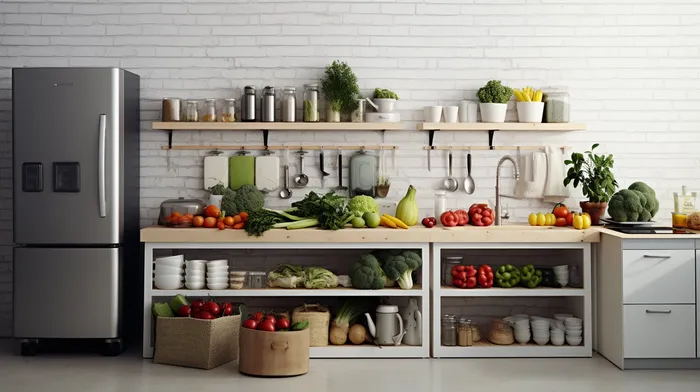Losing weight can be a challenging journey, but knowing which foods to avoid can make all the difference. Food cravings, lack of understanding about healthy eating, and deceptive food marketing tactics all contribute to our widespread weight issues. That’s why it’s crucial to become educated about the “hidden” dangers lurking in your supermarket shelves, as well as the common foods that might be preventing you from losing weight.
Sugar-Sweetened Beverages – The Enemy in Disguise
They’re the epitome of empty calories, yet so many of us mindlessly consume them daily. Sugar-sweetened beverages, including sodas, energy drinks, and specialty coffee drinks, can contribute to weight gain by providing excessive amounts of empty calories and sugar. So, it’s not surprising to find these beverages are closely linked to obesity and type 2 diabetes.
Instead of reaching for a sugar-sweetened beverage, try sipping water infused with fruits or herbs. Green tea and black coffee (without added sugar and cream) are also excellent alternatives. They’re not only calorie-free but also offer additional health benefits.
The Snack Attack
Snacks can make or break your weight loss plans. The typical unhealthy snacks, like chips, candies, and cookies, are laden with unhealthy ingredients such as trans fats, sugar, and empty calories. These foods can by themselves be detrimental to your weight loss journey, not to mention how tempting it is to overindulge.
Instead, try to snack on healthier options like vegetable sticks, fruits, and nuts. Greek yogurt or cottage cheese can also satisfy those cravings while providing essential nutrients like protein and calcium. You may also try making your own healthy snack mixes with whole grains, dried fruits, and nuts.
The Perils of Processed Foods
Processed foods can be found everywhere – from frozen meals to canned soups. They’re convenient and often cheap, but they also tend to be high in unhealthy ingredients like sodium, sugar, and trans fats. Too much of these can contribute to health issues and weight gain. For example, excess sodium can lead to high blood pressure (hypertension) and swelling (edema).
Opting for fresh, whole foods to prepare your meals is typically the healthier option. Instead of reaching for a frozen pizza, try creating your own at home using whole-grain crust and fresh vegetables. Cooking from scratch can help you become more aware of the ingredients you’re putting into your body and move you toward healthier eating habits.
Breakfast Cereals – Not All Created Equal
Breakfast is often considered the most important meal of the day, and with good reason. A well-balanced and nutritious breakfast can set you up for success on your weight loss journey. However, many of us are lured by colorful breakfast cereal boxes, promising an ideal start to your day. Unfortunately, many of these cereals contain a high amount of refined sugar, unhealthy fats, and artificial ingredients.
Choosing a healthier breakfast option can help jumpstart your day on the right track. Look for cereals made from whole grains and low in added sugars. Better yet, try meals that provide a good source of protein, fiber, and complex carbohydrates like oatmeal, avocado toast, or Greek yogurt with fruits.
The Deceptive Diet Foods
Many products on the market are labeled as “diet” or “low-fat.” However, these options may not be as healthy as they claim. Oftentimes, they contain artificial sweeteners, unhealthy ingredients, and added sugars to improve their taste.
It’s essential to read nutrition labels and understand the ingredients in your food. Opt for wholesome foods like fruits, vegetables, lean protein, and whole grains instead of relying on packaged diet foods. A balanced diet incorporating these healthy food groups can lead to weight loss and overall better health.
Watch Out for White Bread and Pasta
White bread and pasta are made from refined grains and can cause spikes in your blood sugar, leading to cravings for more sugary and unhealthy foods. These simple carbohydrates lack the fiber found in whole grains, which contributes to feelings of fullness and satisfaction.
Swap out white bread and pasta for whole-grain versions. These provide more nutrients, such as higher amounts of fiber, vitamins, and minerals. Such swaps can help you feel fuller longer and assist in managing blood sugar levels, which is crucial for sustainable weight loss.
Alcohol – A Caloric Culprit
Alcohol isn’t typically thought of as a contributor to weight gain, but it’s essential to consider the calories it contains. Consuming alcohol regularly can contribute to a surplus of “empty” calories, as it provides little to no nutritional value. Additionally, alcohol has been shown to increase hunger, leading to poor food choices and overeating.
If you choose to consume alcohol, moderation is key. Opt for lower-calorie options like wine or a light beer. Making conscious choices and considering your drink’s caloric impact can help you remain on track with your weight loss goals.
Final Thoughts
Losing and maintaining weight successfully goes beyond simply counting calories. It involves understanding the nuances of your food choices and identifying the right types of calories for your body’s needs. Avoiding or minimizing the intake of the foods mentioned above and incorporating healthier options into your diet can significantly impact your weight loss journey and overall health. Remember that consistency is key, and small changes can add up to significant progress over time.



